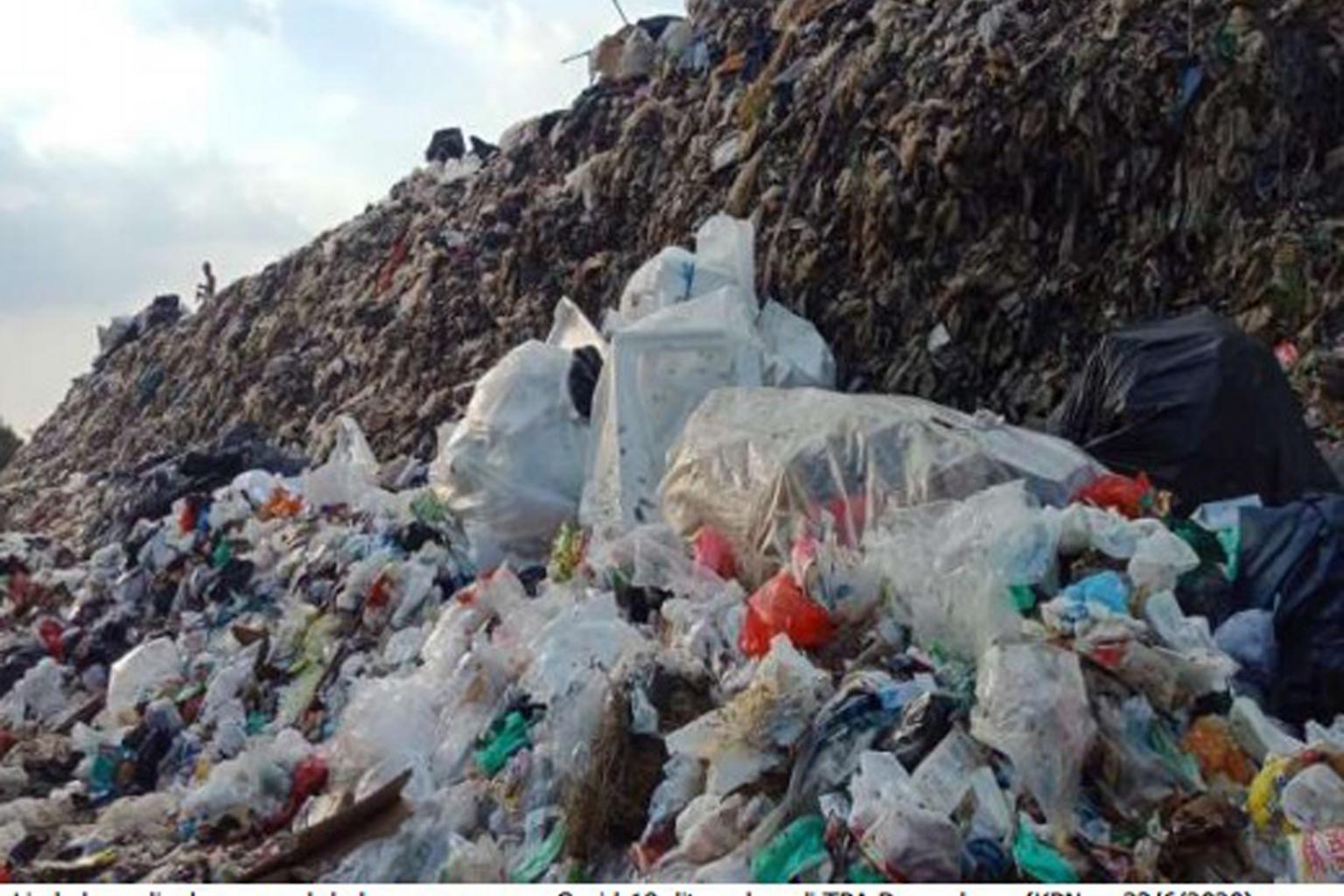Indonesia struggles with mounting medical waste from Covid-19, raising infection fears
Sign up now: Get ST's newsletters delivered to your inbox

Masks and gloves are found scattered among daily household garbage sent to Sumur Batu in Bekasi on the outskirts of Jakarta.
PHOTO: INDONESIA’S NATIONAL WASTE COALITION
Follow topic:
JAKARTA - Surgical masks, gloves, face shields and fluid bags have been found scattered among daily household rubbish at two dumpsites in Bekasi, on the outskirts of Jakarta, raising fears that waste pickers and residents nearby could be infected by the coronavirus.
Meanwhile, healthcare waste made up 16 per cent of the total garbage floating in Cilincing and Marunda river estuaries in Jakarta Bay in March and April this year.
And a key ingredient in disinfectants - chlorine - poses a rising pollution threat to the Brantas River estuary in Indonesia's second largest city Surabaya.
These incidents, part of data collected from agencies such as the National Waste Coalition and the Indonesian Institute of Sciences, are worrying proof that the world's fourth-most populous nation is struggling to manage the mounting medical waste left by the battle against the coronavirus that has infected over 83,000 people and killed nearly 4,000.
Dr Intan Suci Nurhati, a senior researcher at LIPI's Research Centre for Oceanography, said the personal protective equipment (PPE) found in Cilincing and Marunda rivers likely came from households.
Nevertheless, the amount of medical waste, including PPE, syringes and intravenous lines surged by 70 per cent from before the pandemic to 23 tonnes daily during March to May in hospitals treating Covid-19 patients, according to Dr Lina Tri Mugi Astuti, secretary general of the Indonesian Environmental Scientists Association (IESA).
She has been looking at data collected from 71 hospitals treating Covid-19 patients, out of 133 hospitals surveyed jointly by IESA and the Indonesian Hospitals Association from April 1 to May 20.
The average daily volume of waste before the pandemic was 13.6 tonnes.
"That translates into a rise to 1.62kg per (hospital) bed in the pandemic period, from 0.96kg before the pandemic," she told The Straits Times.
Dr Lina said the hospitals should have used incinerators to burn the medical waste.
"Hospitals that do not have their own incinerators can work with a third party. But, at least they have to manage the waste well before disposing them," she said.

Masks and gloves are found scattered among daily household garbage sent to Sumur Batu in Bekasi on the outskirts of Jakarta.
But a senior official in Jakarta dismissed concerns about medical garbage, saying hospitals with incinerators in the capital city are already using incinerators to get rid of their medical waste.
Ms Rosa Ambarsari, head of toxic and hazardous waste management division at Jakarta's Environment Agency said those without incinerators are working with third parties to sort out the medical trash.
Similarly, in Indonesia's second most-populous province of East Java, Mr Mohamad Nizamudin, an official in charge of toxic and hazardous management at the province's Environment Agency, said provincial hospitals are working with medical waste processors.
However, the use of incinerators has raised other concerns for residents who live near such facilities.
Ms Sutamah, a resident of Lakardowo village in Mojokerto, East Java, where a medical waste incinerator is located, said intensified burning during the pandemic is another cause for concern.
"The incinerator now burns more medical waste than before. It spews thick black smoke and pungent odours," the 43-year old said.
She claimed that many village inhabitants have suffered from respiratory and skin problems. The incinerator also destroys medical waste from Bali island.
Asked about addressing chlorine pollution in rivers, executive director of Ecological Observation and Wetlands Conservation Prigi Arisandi said the government must map out locations with higher chlorine levels, then trace the sources.
"Later, there should be control through warning that chlorine waste should not be disposed directly to drainage," he said.
Mr Bagong Suyoto, head of the National Waste Coalition, said that while waste pickers are aware of the risk of Covid-19 infection from the medical waste they sort out, they are left with no choice.
"If they don't pick waste just for a day, they cannot eat. It is better for them to keep working despite the threat of the disease, instead of starving," he said.

